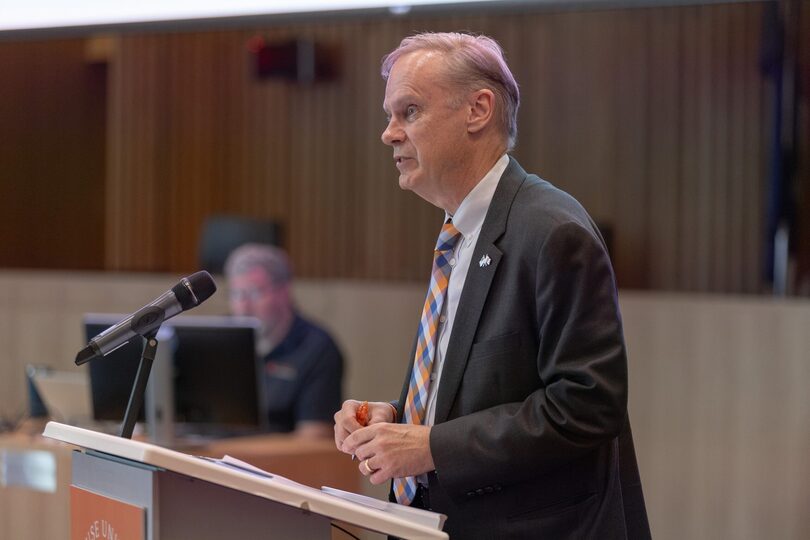Syverud declines Trump ‘compact,’ senators pass portfolio review resolution

Syracuse’s University Senate overwhelmingly voted to pass a resolution that cements the role of faculty in SU’s ongoing portfolio reviews. The resolution asserts the review should have a “formal Senate component” after dean-led reviews. Joe Zhao | Senior Staff Photographer
Get the latest Syracuse news delivered right to your inbox.
Subscribe to our newsletter here.
UPDATE: This post was updated at 11:36 a.m. on October 23, 2025.
Syracuse University Chancellor Kent Syverud said SU won’t sign President Donald Trump’s higher education “compact” during the University Senate’s Wednesday meeting.
Syverud presented a short address to the senate before answering questions on the university’s response to federal policies, during which he said SU won’t sign the compact.
“In its current form, no, Syracuse University is not going to sign the compact. There are parts of the compact that are sensible, including, for example, related to veterans and military-connected students,” he said. “I know some universities — not Syracuse — are meeting with the White House on the compact.”
On Oct. 1, the Trump administration sent its “Compact for Academic Excellence in Higher Education” to nine universities.
The compact, a set of demands from the Trump administration, would require universities to implement administration-set policy on topics like transgender students, international enrollment, tuition and standardized testing in exchange for priority access to federal funding. Most colleges have rejected it.
Syverud said the Board of Trustees and the SU community would decide on signing a hypothetical amended version of the compact, given he will step down at the end of the academic year.
After Syverud’s remarks, the senate overwhelmingly passed a resolution cementing the role of faculty in the portfolio review process. First proposed on Sept. 17, 81% of senators voted in the affirmative to pass a revised version of the resolution.
The resolution “affirms the primary control of the faculty over the curriculum” and asserts the portfolio review should have a “formal Senate component” after dean-led reviews are complete.
In August, Vice Chancellor and Provost Lois Agnew announced she had asked SU deans to re-evaluate programs within their schools throughout the fall semester. The senate resolution proposal came after professors were informed SU had paused admission to majors in the College of Arts and Sciences without faculty input.
Agnew said the ongoing portfolio review will improve the quality of SU’s academic offerings. As she said at the senate’s previous meeting, SU’s 462 program offerings exceed other institutions.
She said Wednesday that 34% of programs account for 80% of total university enrollment, while the remaining 66% account for just 20%.
“This is not to say that we should just cut things off,” Agnew said. “We just can’t have quite as many programs with such low enrollment and serve the needs of our students as well as we need to.”
Agnew said she gave deans nine years of enrollment data, five years of course enrollment data and the faculty composition across programs. She also said she met with deans over the summer to review the data and discuss preliminary findings.
The review could bear different results from program-to-program: immediate closure, enrollment pause, merger or consolidation, “re-envisioning” or no change. Agnew emphasized a pause is a “temporary halt” to admitting new students. She also said immediate closure has thus far only happened to courses that were previously slated to close.
Maria Erdman, a nutrition professor and senator, claimed SU “closed, not paused” the master’s in nutrition science, the bachelor’s in nutrition science and the minor in nutrition science without any discussion. All of those programs shared coursework with other programs, she said.
Agnew emphasized more than once that the purpose of the review is not to cut costs. At its September meeting, Agnew said the above-average number of program offerings means that SU “has tried to support more programs than (it) can afford, and has not adequately invested in programs that have high demand.”
“It’s important to look at the big picture for all of us and figure out how we can make sure all of our programs have the opportunity to help students succeed,” Agnew said.
Syverud also said the university is navigating federal policy in response to a senator’s question about “anticipatory obedience.”
“Much of the stuff that comes out is far from clear. Part of the challenge is deciding, to put it bluntly, what is actually guidance or law, and what isn’t,” Syverud said. “What is a Truth Social post as opposed to an actual rulemaking?”
Other business
- Syverud said the Chancellor Search Committee, partnered with search and consulting firm Spencer Stuart, has begun reviewing candidates for his successor. The committee finalized its position profile last week.
- Rick DiRubbo, a professor in the College of Engineering and Computer Science, discussed some of the projects the Committee on Curriculum and Instruction is working on this school year. One of the items included “look at the current process of reviewing IDEA courses.”
- Brian Lonsway, a professor at SU’s School of Architecture, explained some of the Committee on Research and Creative Scholarship’s considerations for the school year, including the “impact of federal actions” on academic freedom in research and creative scholarship at SU.





